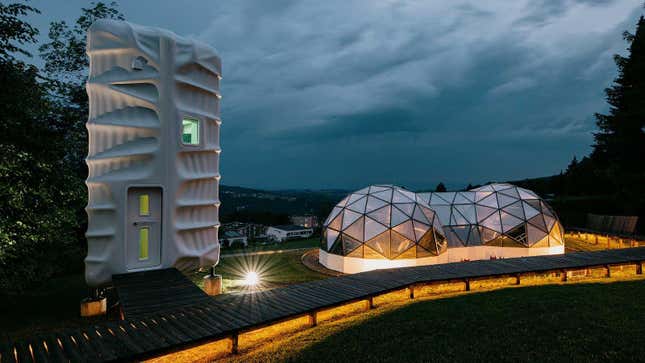
For students at a boarding school in Switzerland, the curriculum now includes extraterrestrial architecture. The school has installed a 23-foot-tall, 3D-printed prototype of a space habitat that was designed with SpaceX rockets in mind.
Exploring the universe and beyond is no small feat, but a major part of that adventure will involve building structures that are conducive to humans thriving in environments that are constantly trying to kill them. Faculty at Institut auf dem Rosenberg—a Swiss boarding school for students aged 6 to 18—are beginning to tackle this issue with the Rosenberg Space Habitat.
The habitat is being treated as a laboratory where students at the school can study science, architecture, and life on another planet without having to leave their own campus. The Rosenberg Space Habitat features a Boston Dynamics robot dog and a three-story 3D-printed tower for a two-person crew that was designed in collaboration with SAGA Space Architects, a Danish architecture firm.
“The Rosenberg Space Habitat is state-of-the-art in analog space habitats,” said Sebastian Frederiksen, founder of SAGA Space Architects, in the institute’s press release. “It was developed in record time from initial sketches to the final fully functioning habitat in just months.”
Institut auf dem Rosenberg wants to place sustainability at the forefront of this project; to that end, the habitat is powered by wind trees (a type of wind turbine) and the polymer used to print the main tower can be broken down and recycled into other 3D printed structures. Intriguingly, the main tower was specifically designed to be able to fit into a SpaceX Starship rocket.
Each floor of the tower features a different purpose; the first floor is a dedicated workshop and lab space, the second floor is for recreation, and the third is for rest. Experiments in the habitat will mainly study the impact that extraterrestrial life might have have on humans, including modules that focus on mental well-being and the role of sensory stimulation in remote environments.
“Our aim is to provide future leaders with early exposure to the question of advanced space exploration, allowing our students to approach and solve these complex questions from a collaborative and holistic point of view,” said Rosenberg Director General Bernhard Gademann. “At Rosenberg, infusing education with real-life context is at the heart of what we do, rather than focusing on pure academics alone.”
Keeping humans alive in inhospitable environments will be the main goal of any off-world settlement. A fascinating aspect of this project is how the architecture itself can contribute to this goal and how these structures will allow their inhabitants to both survive and thrive.
More: ‘Precarious’: NASA Advisers Worry About the Next Generation of the ISS